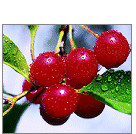
|
home > cherry facts > fast facts > page 2
Fast facts About Michigan Tart Cherries - 2
- There are about 55,000 acres of red tart cherries nationwide, with Michigan accounting for
nearly 40,000 acres and producing about 75% of the crop (NASS, 1996).
- In addition, sweet cherries account for 10,000 acres in Michigan;
there are about 47,000 acres nationwide. In Michigan, the total farm value for both tart and
sweet cherries is $ 30 to $50 million, depending on the size of the crop.
- In Michigan, the total farm value for both tart and sweet cherries is $ 30 to $50 million,
depending on the size of the crop and price paid to growers.
- The value added by processing, manufacturing into other products, and marketing fresh
product increases the farm value about three times to $100 to $150 million or more in
Michigan alone (MASS, 1996).
- Other states with commercial crops of tart cherries include Utah, New York, Washington,
Wisconsin and Pennsylvania.
- Select regions in western lower Michigan have particularly favorable soil and climatic
conditions for growing cherries. Orchard soils are predominantly well drained, sandy loam
to loamy sand, glacially deposited soils of low to moderate fertility. The climate is moderated
by proximity to Lake Michigan, which results in long, frost-free autumns and a delayed
spring bloom period.
- The major variety of tart cherry grown in Michigan is Montmorency, although minor acreage of
Meteor and more recently, Balaton are grown. Trees are commonly grafted to Mahaleb
rootstock, with some use of Mazzard and the MxM rootstocks.
- Cherries, like other fruit crops in Michigan, are grown on sloped sites to avoid spring
frosts. The climate in western lower Michigan is unique because of the location on the east side
of Lake Michigan. The lake has a moderating effect on temperatures, which results in long, frostfree
autumns and a delayed spring bloom period.
- Nearly all red tart cherries are harvested with mechanical shakers. The cherries are harvested
from the trees directly into large tanks containing 48ºF water. The fruit remains in the tanks
for six to eight hours, while being constantly flushed with cold water. Flushing the cherries
with cold water helps cool the cherries quickly to help maintain fruit quality, washes the
cherries, and helps minimize fruit bruising while en-route to the processing plant.
- Once cooled, the cherries are taken as quickly as possible to nearby processing facilities
where the fruit is pitted and either canned or frozen. On average, Michigan produces 200 to 250
million pounds of tart cherries; total U.S. production averages 250 to 300 million pounds.
- It is critical that several key insect, disease, and weed pests be effectively controlled to
maintain adequate yields of quality fruit that is acceptable to consumers.
- Tree growth and vigor, and fruit ripening must be managed to maintain the health and
longevity of cherry orchards.
- Unfortunately for cherry growers, a host of pest problems, which include insects, disease-causing pathogens, and weeds,
threatens cherries. Also, tree growth and vigor, and fruit ripening must be managed to maintain
the health and longevity of cherry orchards.
- Over time a tart cherry production system that relies on routine pesticide applications to
control pests had evolved.
- Industry concerns about environmental quality, worker and food safety, pest resistance to
pesticides, increasing production costs, potential loss of important pesticide tools, and the
encroachment of urban area on prime cherry production sites, have caused the cherry
industry to carefully re-evaluate what had become the standard production system.
- Cherry growers have responded by adopting innovative integrated pest management (IPM)
and other cultural practices that reduce pesticide use, improve operator safety and protect the
environment, yet maintain the stringent quality standards demanded by the marketplace.
back
|
|





